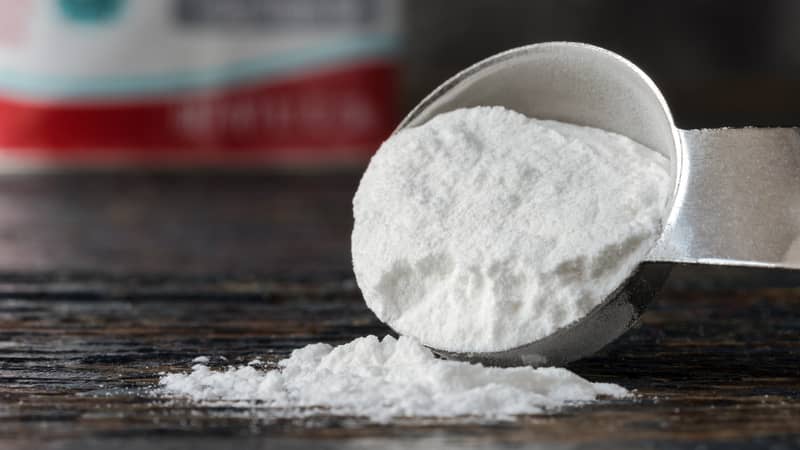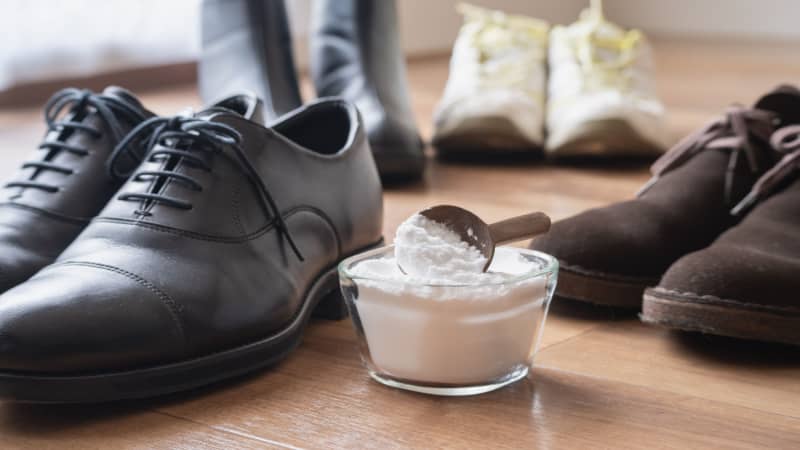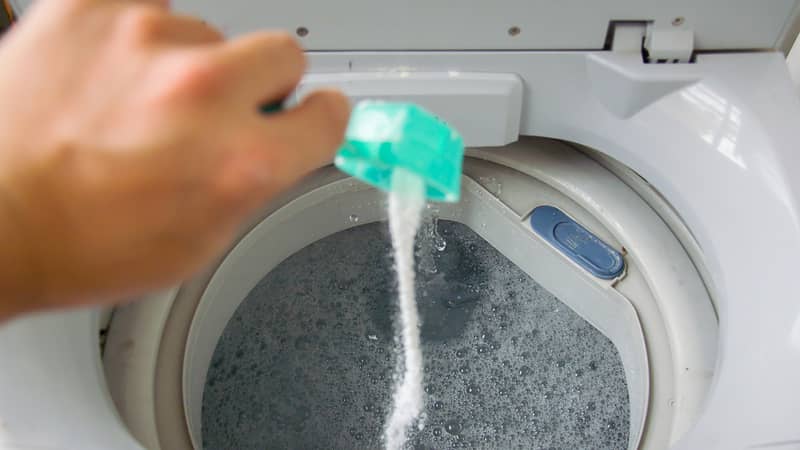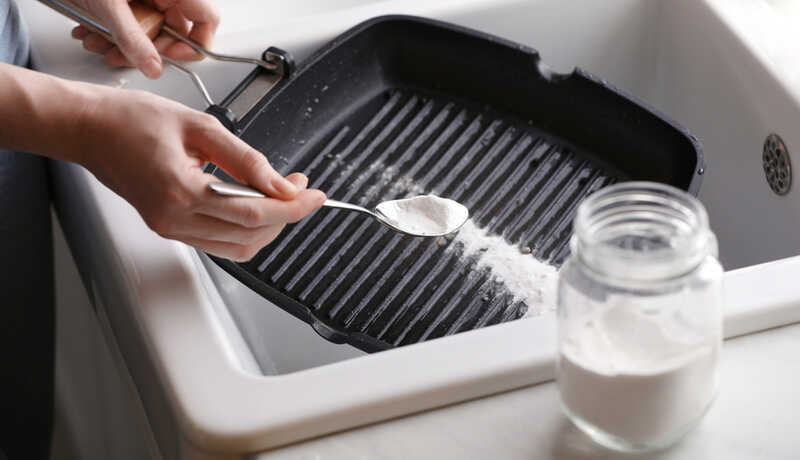Baking soda and baking powder — ingredients no pantry would dare to be without.
They hold the reputation of miracle workers in the kitchen, responsible for those fluffy pancakes, crispy cookies, and perfectly risen bread.
But their magic extends beyond culinary endeavours.
These substances have potent cleaning capabilities that make them worthy of a spot in your cleaning arsenal.
So, which one is more effective when it comes to cleaning?
Are they interchangeable, or does each have its unique niche?
How are Baking Powder and Baking Soda Different?
On a basic level, baking soda and baking powder differ in their chemical composition and taste.
Baking Soda

Baking soda, also known as sodium bicarbonate or bicarb soda, is a base mineral that reacts when it comes into contact with acids.
The reaction leads to the production of carbon dioxide gas, which can produce bubbles in baking or, in cleaning, can help to dislodge grime and dirt.
Baking soda’s alkaline nature enables it to react with acids in stains and dirt, making it a more potent cleaning agent than baking powder.
It’s such an awesome cleaning agent that house cleaning experts recommend it as a green alternative when you want to make your home spotless and fresh-smelling.
Notes on Taste
If you’ve tried baking soda to whiten your teeth, you’ll know it has a salty and slightly bitter aftertaste.
In recipes, baking soda is usually mixed with acidic ingredients to produce a gas-forming chemical reaction.
pH Level of Baking Soda
Baking soda is an alkaline substance, meaning it has a pH level higher than 7 (which is considered neutral).
The pH of a saturated solution of baking soda in water at room temperature (25°C) is approximately 8.3.
This alkalinity is what allows baking soda to neutralise acids, making baking soda the better choice for cleaning.
Baking Powder

On the other hand, baking powder is a mixture that contains baking soda, leavening agents (usually starch) and an acidifying agent (like cream of tartar).
Simply put, baking powder is still baking soda with a fluffy texture and additional acidic ingredients.
When moistened, baking powder undergoes a chemical reaction that releases carbon dioxide gas, much like baking soda.
This double action — an initial reaction when wet and a secondary reaction when heated — makes baking powder an excellent leavening agent in baking.
However, when it comes to cleaning, the presence of acidic ingredients in baking powder often makes it less effective than baking soda.
Notes on Taste
Baking powder has a base and an acid, but it doesn’t mean it tastes bitter and sour simultaneously.
In fact, baking powder has a neutral taste, at least compared to baking soda.
pH Level of Baking Powder
Baking powder is generally neutral in pH.
This is because it’s a mixture of a weak acid (often cream of tartar or a similar acid salt) and a base (baking soda or a similar alkali).
When dry, these two components don’t react with each other.
However, when baking powder is mixed with a liquid, the acid and base react to produce carbon dioxide — allowing baked goods to rise.
Best Ways to Use Baking Soda for Cleaning Purposes
Baking powder may be more popular among home bakers, but baking soda is the darling of home cleaners.
Google ‘natural cleaning ingredients’, and you’ll see that baking soda is the star in almost every homemade cleaning recipe.
Natural Deodoriser

Sprinkle baking soda in your trash bin, shoes, or refrigerator to remove unpleasant smells.
Baking soda neutralises both acid and basic odours for a natural deodorisation.
Kitchen Scrub
Make a paste of baking soda and water to scrub away tough kitchen stains.
It’s non-abrasive, making it safe to use on stainless steel sinks and cookware and to clean your stovetop.
Bathroom Cleaner
The same baking soda paste used in the kitchen can be used to clean toilets, bathtubs, and sinks.
It removes grime and leaves surfaces shining.
Carpet Cleaner
Sprinkle baking soda over your carpet, let it sit for 15–20 minutes, and then vacuum it up to remove household odours and freshen up your carpet.
Laundry Booster

Add 170g of baking soda to your laundry to brighten colours, soften fabrics, and remove unpleasant odours.
Drain Cleaner
Pour 170g of baking soda down a clogged drain, followed by 170g of white vinegar.
Wait 15–20 minutes, and then rinse with hot water.
The chemical reaction between baking soda and white vinegar can help to break up clogs.
Silver Polish
Add a paste of baking soda and water to clean sterling silverware with a damp cloth.
Rinse off and dry for a natural and non-toxic silver polish.
FAQs on Cleaning with Baking Powder and Baking Soda
Can baking powder be used as a cleaner?

Baking powder can be used as a cleaner, but baking soda is more effective.
The reason is that baking powder already contains an acidifying agent (such as cream of tartar), and its cleaning power relies on the chemical reaction between an alkaline (base) substance and acid.
Since baking powder already has both base and acid components, its reactivity and cleaning effectiveness are generally lower than baking soda.
What can you not clean with baking soda?
While baking soda is a versatile cleaning agent, it’s not suitable for every surface or material:
- Aluminium cookware: Baking soda can cause aluminium to oxidise, leading to discolouration.
- Antique silver (non-sterling silver): It can be too abrasive and potentially scratch the surface. It’s safer to use a proper silver polish.
- Certain types of hardwood floors and furniture: It could damage the finish, especially if it’s not properly diluted.
- Delicate surfaces or those prone to scratching: Baking soda is mildly abrasive, so it’s always a good idea to do a patch test before using it on new material.
Can I use baking powder to remove stains?
Baking powder is not as effective as baking soda for removing stains.
The reason is that baking powder contains both an acid and a base, neutralising its reactivity – the property that gives baking soda its cleaning power.
That said, baking powder can still be used for light cleaning tasks or minor stains.
To use it, sprinkle a small amount on the stain, moisten it with water to create a paste, gently scrub, and then rinse.
However, baking soda or a specialised cleaning product will likely be more effective for heavy or deep stains.
Can I mix baking powder and lemon juice for cleaning?
Mixing baking powder and lemon juice for cleaning can have some effect, but it may not be as potent as using baking soda instead of baking powder.
So, you’re better off using baking soda and some lemon juice.
This combination can be a powerful cleaning agent due to the reaction between the citric acid in the lemon juice and the alkaline baking soda, which produces a fizzing action.
Soda-t’s What It’s For!
While baking soda and baking powder share some similarities, their differences make baking soda the superior option for cleaning.
Its ability to react with a wide range of stains and odours, coupled with its non-abrasive nature, makes it a versatile and safe cleaning agent.
So, the next time you’re looking for an effective, natural, and affordable cleaning solution, don’t overlook that box of baking soda sitting in your pantry.

